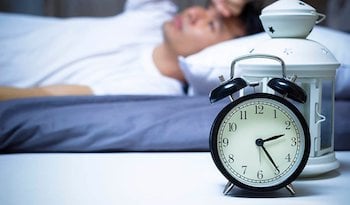What Is GABA? Why This Supplement May Help With Better Sleep
DISCLAIMER:This blog does not intend to provide diagnosis...
- In this article:
- What Is GABA?
- What Does GABA Do?
- GABA Deficiency
- GABA's Sleep Benefits
- GABA's Relaxation Benefits
- GABA's Stress and Mental Function Benefits
- GABA Muscle and Athletic Benefits
- GABA and Blood Pressure
- Forms of GABA + Food Sources
- Safety and Side Effects

Updated January 2024 / Originally Posted 2017
What Is GABA?
Gamma-aminobutyric acid (GABA) is a neurotransmitter in the central nervous system (CNS).
What Does GABA Do?
GABA is one of the brain's most important regulators of proper function.
Insufficient levels of GABA can produce poor sleep quality, anxiety, depression, and impaired ability to focus and concentrate.
Detailed clinical studies have shown that GABA supplements may produce beneficial effects in boosting GABA levels and thus improve sleep quality, feelings of calmness, mental focus, and cognitive function.[1-6]
GABA Deficiency
Aging is a key factor in a decline in the manufacture of GABA and its function. Nutrition plays a role, but so does a decrease in a variety of hormones as people age.
The decline in GABA levels and function associated with aging affects many systems in the body, especially the brain and nervous system. The age-related decrease in GABA is associated with feelings of anxiety, lower mood, and feelings of stress that can also affect blood pressure control.[4]
GABA's Sleep Benefits
Natural forms of GABA have been shown to promote improved sleep, especially with continued use.[5]
In one study with PharmaGABA, 38 senior-aged subjects were given 100 mg of PharmaGABA or a placebo for four weeks.[12] Salivary cortisol levels were measured as a stress indicator, and a questionnaire survey about sleep and quality of life (QOL) was conducted. The PharmaGABA group showed only a small rise in cortisol levels after 2 and 4 weeks, while the placebo group showed a significant increase in cortisol. A survey showed an improvement in the quality of sleep. In the PharmaGABA group, people experienced sleeping more easily, reduced nighttime awakenings, less drowsiness in the morning, and improved recovery. Those in the PharmaGABA group also experienced a reduced frequency of nighttime urination.
Even a single administration of PharmaGABA has been shown to improve sleep. Another double-blind study assessed brain wave patterns through electroencephalography (EEG) after subjects took 100 mg of PharmaGABA or a placebo.[13] The results demonstrated that PharmaGABA significantly shortened the time required to get to sleep by five minutes and increased the time of quality sleep compared to the placebo. Questionnaires showed that subjects receiving PharmaGABA had improved sleep, especially noted by their higher energy scores upon awakening.
The study also measured the blood level of GABA after the administration of PharmaGABA. Results showed that the GABA was quickly absorbed, and the blood level of GABA was the highest 30 minutes after oral administration. The researchers felt that taking GABA 30 minutes before bedtime offers the best effects on promoting restful sleep.
In a study with a GABA product derived from fermented barley (Sanwa GABA), men and women between the ages of 39 and 59 were given either 100 mg of Sanwa GABA or a placebo 30 to 60 minutes before bedtime. Results showed GABA significantly increased deep sleep in subjects over 44 years old and those subjects experiencing psychological stress or fatigue.[14]
In another double-blind study with Sanwa GABA, 62 subjects dealing with sleep problems, stress, and fatigue experienced significant improvements in sleep quality, subjective ratings of fatigue, and feelings of vigor and vitality.[15]
GABA's Relaxation Benefits
Detailed clinical studies have shown natural forms of GABA to produce various effects in promoting calmness but with increased mental focus and improved thinking.[1-5] Natural forms of GABA promote relaxation by:
- Activating the parasympathetic nervous system
- Increasing the alpha-to-beta brainwave ratio.
- Reducing markers of stress, including cortisol levels.
Once ingested, PharmaGABA and other natural forms of GABA bind to receptors in the gastrointestinal tract that feed into the peripheral nervous system to transfer this information to the brain. The brain processes this information in a way that leads to activating the parasympathetic nervous system. While activating the sympathetic nervous system produces feelings of stress and the well-known "fight or flight" response, activating the parasympathetic nervous system produces the "relaxation response." Studies have shown taking PharmaGABA activates the parasympathetic nervous system within 5 to 30 minutes.[8] This effect comes in handy in helping people deal with feelings of stress and prepare for a good night's sleep.
PharmaGABA also stimulates the production of alpha brain waves while also reducing beta waves (associated with nervousness, scattered thinking, and hyperactivity). Increasing alpha waves promotes more focused thinking.[9]
GABA's Stress and Mental Function Benefits
Clinical studies with PharmaGABA and other natural forms of GABA have yielded some very interesting results.
For example, one study had subjects who were afraid of heights transverse a long walking suspension bridge that spanned a 150-foot canyon. Halfway across the bridge, a saliva sample was obtained, and blood pressure was determined. What the researchers were looking for in the saliva was the level of secretory IgA – an important antibody in saliva that helps fight infection. Typically, during times of stress saliva levels drop, sometimes quite precipitously. This event happened when the subjects were given a placebo, but when they were given PharmaGABA, the secretory IgA levels in the saliva were maintained halfway across the bridge and increased upon completion of the crossing.[9]
Studies with PharmaGABA have also shown that it can help improve focus and attention. For example, in a study conducted in Japan by researchers from the Kyorin University Medical School, 6th-grade students were divided into two groups: 100 mg of PharmaGABA or a placebo.[10] The students then took a math test and were evaluated for signs and feelings of stress. The results were quite dramatic. The average number of answers answered by the PharmaGABA group was 20% higher than the placebo group, and the number answered correctly also increased by 20%. These results indicate that PharmaGABA helped the kids think faster and get more answers right.
The study also looked at some important markers of stress. These markers included measuring the amount of a stress-related hormone in the saliva and how much anxiety the children were experiencing during the study. Both subjective and objective measures of stress indicated the PharmaGABA group was considerably more relaxed and focused than the placebo group.
PharmaGABA has also helped adults improve focus and attention in double-blind clinical studies. For example, in a study of adults over 40, PharmaGABA was shown to help control and maintain attention. It also enhanced the ability to reason and understand visual or abstract information. As a result, PharmaGABA is the first substance of any kind shown to improve logical thinking. It also improved both short-term and long-term memory.[11]
PharmaGABA is an excellent choice if poor concentration and focus are due to feelings of stress or anxiety. Higher brain functions (like critical thinking) function better when relaxed. Stress hormones like cortisol can interfere with higher brain functions. Fortunately, PharmaGABA can reduce cortisol and promote feelings of relaxation, but with higher brain energy and the ability to focus.
GABA Muscle and Athletic Benefits
GABA is a popular sports nutrition supplement, but most products contain the synthetic form. Much of the focus in marketing these products has been on GABA's role in supporting growth hormone (GH) secretion and, as a result, possibly promoting muscle growth. Synthetic GABA at dosages of 3 to 10 grams has been shown to promote increased GH levels, but this dosage may be well beyond a physiological or safe level.[6]
In contrast, PharmaGABA is very safe and has been shown to increase growth hormone (GH) secretion in response to weightlifting exercise at a dosage level of 100 mg per day.[7] This difference in dosage provides a clear comparison and shows the advantage of using the natural form GABA.
Here are the details of a double-blind clinical trial conducted in Japan looking at PharmaGABA, GH levels, and muscle growth.[7] The subjects were 26 healthy male volunteers divided into two groups: whey protein 10 g/day (WP group) or whey protein 10 g/day + GABA 100 mg/day (WP+G) group.
After 12 weeks, the change in whole-body lean mass was significantly higher in the WP+G group than in the WP group. The difference in whole-body lean mass in the WP+G compared to WP alone was substantial. The WP group showed a less than 200 g increase in lean muscle mass, while the WP+G showed nearly a 1,400 g increase in lean muscle mass. The study also looked at resting GH levels throughout the study, and the results confirmed a positive effect of PharmaGABA on GH levels. At the 4-week checkup, the GH concentration in the WP+G was 689 pmol/L compared to 387 pmol/Lin in the WP group.
These results have significant ramifications for athletes trying to maximize performance and aging adults seeking to preserve or even build muscle mass.
There is another beneficial action of PharmaGABA in supporting exercise-induced muscle growth besides raising GH levels. Poor sleep quality is a big problem in athletes and older adults. Poor sleep quality inhibits some of the muscle-building benefits of weight training. As PharmaGABA improves sleep quality, this effect is the major factor for the observed effect of increased muscle mass in response to weight training exercises noted in this double-blind study.
GABA and Blood Pressure
GABA, as a neurotransmitter, has long been known to influence blood pressure and heart rate through its action on the parasympathetic nervous system and through its action on receptors in heart and vascular tissue known as baroreceptors.
These baroreceptors can sense increased blood pressure and respond in a way that can promote the relaxation of the walls of the arteries to reduce blood pressure.
Natural forms of GABA and a variety of Gaba-enriched food products such as chlorella, yogurt, rice, beans, tomatoes, and bread have been shown to help maintain healthy blood pressure control.[1-5] For example, one double-blind study with GABA-enriched chlorella providing a daily dosage of 40 mg of GABA for 12 weeks was shown to produce significant improvements in blood pressure control subjects with high-normal blood pressure.[16]
Forms of GABA + Food Sources
Taking a dietary supplement form of GABA is an obvious method to boost GABA effects naturally. But it is not that simple. The form of GABA is essential to consider. Synthetic GABA has shown that it does not produce the same benefits as natural forms of GABA produced through fermentation processes such as PharmaGABA.[1-5]
Some synthetic forms of GABA are produced from pyrrolidinone, an industrial solvent that is not safe for humans. Other synthetic forms use similar toxic compounds. In contrast, PharmaGABA, the most well-researched form of GABA, is made through a natural fermentation process with the help of Lactobacillus hilgardii – a probiotic bacteria used to make kimchi, a fermented vegetable dish popular in Korean cuisine. Other natural sources of GABA include products from fermented barley (Sanwa GABA) or rice germ.
Natural forms of GABA, like PharmaGABA, are approved for use in Japan as an aid to conquer stress and promote relaxation. Japan has a very practical regulatory system for food ingredients. If a food or food ingredient has sufficient clinical evidence of safety and effectiveness, it may be registered as a Food for Specified Health Use (FOSHU) by the Japanese equivalent of the FDA. Japan also allows Foods with Function Claims (FFC) to help consumers understand the health benefits of foods and dietary supplements. One of Japan's stars of the FOSHU and FFC status is a natural form of GABA-led PharmaGABA.
It is important to note that synthetic forms of GABA do not have FOSHU of FFC status in Japan. Over 300 food products and dietary supplements containing natural GABA are currently available in Japan with full FOSHU or FFC status.
Safety and Side Effects
Natural forms of GABA, like PharmaGABA, have not produced any side effects or adverse drug interactions in human clinical trials. As a general guideline, it is recommended to take no more than 600 mg within a 6-hour period and no more than 1,200 mg within 24 hours.
References:
- Heli Z, Hongyu C, Dapeng B, Yee Shin T, Yejun Z, Xi Z, Yingying W. Recent advances of γ-aminobutyric acid: Physiological and immunity function, enrichment, and metabolic pathway. Front Nutr. 2022 Dec 22;9:1076223.
- Ngo DH, Vo TS. An Updated Review on Pharmaceutical Properties of Gamma-Aminobutyric Acid. Molecules. 2019 Jul 24;24(15):2678.
- Liwinski T, Lang UE, Brühl AB, Schneider E. Exploring the Therapeutic Potential of Gamma-Aminobutyric Acid in Stress and Depressive Disorders through the Gut-Brain Axis. Biomedicines. 2023 Nov 24;11(12):3128.
- Mills DJ. The Aging GABAergic System and Its Nutritional Support. J Nutr Metab. 2021 Apr 25;2021:6655064.
- Hepsomali P, Groeger JA, Nishihira J, Scholey A. Effects of Oral Gamma-Aminobutyric Acid (GABA) Administration on Stress and Sleep in Humans: A Systematic Review. Front Neurosci. 2020;14:923.
- Oketch-Rabah HA, Madden EF, Roe AL, Betz JM. United States Pharmacopeia (USP) Safety Review of Gamma-Aminobutyric Acid (GABA). Nutrients. 2021 Aug 10;13(8):2742.
- Sakashita M, Nakamura U, Maru I, et al. Combined oral intake of GABA with whey protein improves lean mass in resistance-trained men. Med Sci Sports Exerc. 2016 May;48(5 Suppl 1):54.
- Fujibayashi M, Kamiya T, Takagaki K, Moritani T. Activation of autonomic nervous system activity by the oral ingestion of GABA. J Jpn Soc Nutr Food Sci 2008:61:129-133.
- Abdoua AM; Higashiguchia S, Horiea K, et al. Relaxation and immunity enhancement effects of Gamma-Aminobutyric acid (GABA) administration in humans. BioFactors 2006;26:201–208
- Konagai C, Nakamura K, Koga Y, et al. Effect of PharmaGABA on reduction of school child's study stress effect. Japanese Society Nutrition Food Science. 2008;62:172.
- Yamatsu A, Nakamura U, Saddam HM, et al. Intake of 200 mg / day of gamma-aminobutyric acid (GABA) improves a wide range of cognitive functions. Jpn Pharmacol Ther 2020;48 (3):461‐474.
- Yamatsu A, Takeshima K, Yamane T, et al. Beneficial action of GABA on sleep and frequent night urination in the elderly. Japanese Pharmacology and Therapeutics. 2013;41:985-988.
- Yamatsu A, Yamashita Y, Pandharipande T, Maru I, Kim M. Effect of oral γ-aminobutyric acid (GABA) administration on sleep and its absorption in humans. Food Sci Biotechnol. 2016 Apr 30;25(2):547-551.
- Hokazono H, Fukuda, R. Effects of oral γ-Aminobutyric acid (GABA) administration on sleep in healthy adults - A randomized, double-blind, placebo-controlled, crossover study. Japanese Pharmacology and Therapeutics. 2018;46:757-770.
- Hokazono H, Saito J. Effects of γ-aminobutyric acid (GABA)-containing food on mood status and sleep quality in worker: -A double-blind randomized controlled trial. Japanese Pharmacology and Therapeutics, 2016, 44(10), 1445-1454. |
- Shimada M, Hasegawa T, Nishimura C, et al. Anti-hypertensive effect of gamma-aminobutyric acid (GABA)-rich Chlorella on high-normal blood pressure and borderline hypertension in placebo-controlled double-blind study. Clin Exp Hypertens. 2009 Jun;31(4):342-54.

 By Dr. Michael Murray, N.D.
By Dr. Michael Murray, N.D. 


